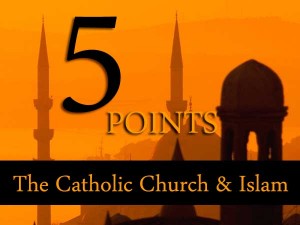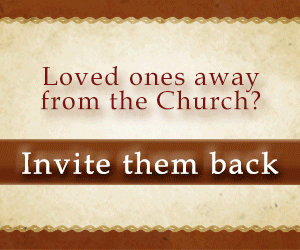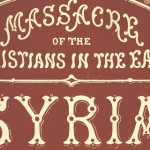 Last year, I was working in a Daughters of St. Paul bookcenter when a young Muslim man came into the store. He heatedly engaged me with many questions including, “Do you think I am going to hell?” He also asked me whether holy water would burn him if he touched it. It was clear that the young man knew very little about Catholicism, but he was curious. I was grateful for his desire to interact with me and to ask questions. In fact, we both asked each other a lot of questions.
Last year, I was working in a Daughters of St. Paul bookcenter when a young Muslim man came into the store. He heatedly engaged me with many questions including, “Do you think I am going to hell?” He also asked me whether holy water would burn him if he touched it. It was clear that the young man knew very little about Catholicism, but he was curious. I was grateful for his desire to interact with me and to ask questions. In fact, we both asked each other a lot of questions.
I have not known and regularly interacted with many Muslims. I’d wager that my limited experience with Muslims mirrors most people’s experiences in the United States. In Oklahoma, where I am from, less than 1% of the population is Muslim. This is true for most of the United States; Muslims make up around .8% of the population.
It’s hard to gain experience about a group of people without rubbing elbows with them. It’s even harder to be objective about a group of people that includes extremists who hog the news headlines with nausea-inducing details of grisly beheadings and suicide bombings.
When I do not have real-life experience to help me remain objective, I feel grateful that I am Catholic. Without the guidance of my faith, I think it would be easy for me to fall into bigotry and fear-mongering, especially considering some of the disturbing news as of late. Thankfully our faith, although it does not provide all the answers, does provide a foundational attitude from which we can begin.
I thought I would share some of the main points I gathered about Islam from the words of recent popes and Church documents:
- We Worship the Same God: The Vatican II document, Lumen Gentium, makes this clear:
[T]he plan of salvation also includes those who acknowledge the Creator, in the first place among whom are the Muslims: these profess to hold the faith of Abraham, and together with us they adore the one, merciful God, mankind’s judge on the last day. (emphasis mine)
2. Islam Contains Rays of Truth and Holiness: The Vatican II document, Nostra Aetate, says:
The Catholic Church rejects nothing of what is true and holy in these religions. She has a high regard for the manner of life and conduct, the precepts and doctrines which, although differing in many ways from her own teaching, nevertheless often reflect a ray of that truth which enlightens all men.
- Islam and Christianity Share Common Values: Saint Pope John Paul II, during a visit to Turkey, urged Muslims to recognize and work together with Christians for the values that we share:
I wonder if it is not urgent, precisely today when Christians and Muslims have entered a new period of history, to recognize and develop the spiritual bonds that unite us, in order to preserve and promote together for the benefit of all men, ‘peace, liberty, social justice and moral values’ as the Council calls upon us to do (Nostra Aetate 3).
A perfect example of promoting common values happened recently in Boston where Cardinal O’Malley and the archdiocese worked with Muslims to defeat an assisted suicide bill.
- Dialogue is Important and Valuable: Both Pope Francis and Pope Emeritus Benedict XVI emphasize proper formation for interreligious dialogue but nevertheless they encourage Muslims and Christians to get to know one another better:
I was glad to be able to express my esteem for Muslims and to reiterate the commitment of the Catholic Church to carry forward inter-religious dialogue in a spirit of mutual respect and friendship, bearing joint witness to the firm faith in God that characterizes Christians and Muslims, and striving to know one another better so as to strengthen the bonds of affection between us. (Pope Emeritus Benedict XVI)
It is important to intensify dialogue among the various religions, and I am thinking particularly of dialogue with Islam. (Pope Francis)
- Avoid Generalizations: This is probably the most common mistake that occurs in conversations about Islam. Many people conflate the minority of radical Muslims with the rest of the more than 1 billion Muslims in the world. As surveys have shown, a clear majority of Muslims all over the world do not support violence in the name of Islam. Pope Francis writes in Evangelii Gaudium:
Faced with disconcerting episodes of violent fundamentalism, our respect for true followers of Islam should lead us to avoid hateful generalizations.
– – –
Finally, from the most important document of our faith, the Bible, we find very clear words from Jesus that should guide our feelings about even the most radical Islamic terrorists:
You have heard that it was said, ‘You shall love your neighbor and hate your enemy.’ But I say to you, love your enemies, and pray for those who persecute you, that you may be children of your heavenly Father. (Mt 5:44-45)
– – –
Some will no doubt consider this post to be an example of pluralism for its own sake, political correctness and/or naïveté. The Church’s teachings can at times come across as backwards, harsh and old-fashioned and at other times schmaltzy and idealistic.
That’s the cross of being Catholic; we hang in the balance, sometimes appearing to hang out on the left, others toward the right. But, if we stick with the Church and her teachings, we can be sure we will remain at the center with Jesus. We can also be sure to remain objective and untainted by ugly generalizations and the human tendency to make a villain of what we do not know.












